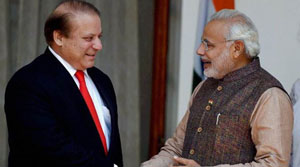Kabul, Dec 25: In a major surprise, Prime Minister Narendra Modi will be flying to Lahore this afternoon, his first touchdown in Pakistan, where he will meet his counterpart Nawaz Sharif.
The announcement came from Modi himself in a tweet as he prepared to wind up his brief visit to Afghanistan.
"Looking forward to meeting PM Nawaz Sharif in Lahore today afternoon, where I will drop by on my way back to Delhi," he tweeted.
"Spoke to PM Nawaz Sharif & wished him on his birthday," Modi added in another tweet.
Earlier this morning, the Prime Minister tweeted greetings to Sharif on his 66th birthday and wished him good health.
"I wish the Prime Minister of Pakistan, Mr Nawaz Sharif on his birthday and pray that he remains in wonderful health," tweeted Modi from Afghanistan where he landed in the wee hours while returning from Moscow.
The relations between India and Pakistan have witnessed some positive developments after chill for several months. The two countries recently decided to launch a comprehensive dialogue after Modi and Sharif met in Paris





Comments
Add new comment